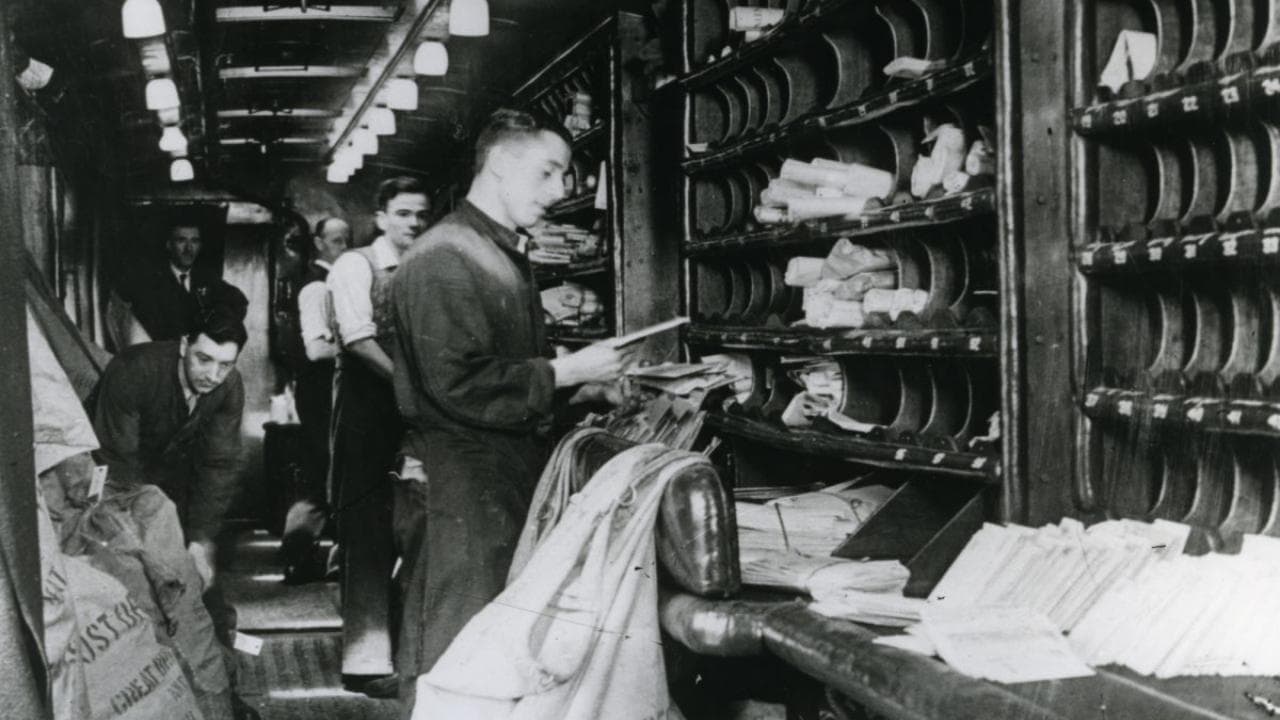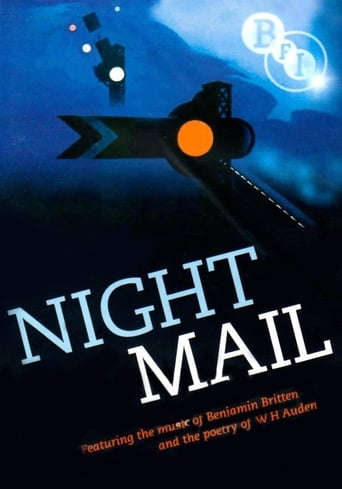



Save your money for something good and enjoyable
I am only giving this movie a 1 for the great cast, though I can't imagine what any of them were thinking. This movie was horrible
View MoreA story that's too fascinating to pass by...
Great example of an old-fashioned, pure-at-heart escapist event movie that doesn't pretend to be anything that it's not and has boat loads of fun being its own ludicrous self.
View More. . . England ran a steam punk version of the Pony Express, NIGHT MAIL contends. An outrageous blend of the most impractical aspects of "Willie Wonka" and "Rube Goldberg," this alleged operation involved Snow White's Seven Dwarfs sorting 500 million letters into 336 pigeonholes, according to a breathless narrator, who winds up getting so wound up that he begins rapping Middle Earth-type place names that are probably only figments of J.R.R. Tolkien's imagination. Though most of the extras recruited to film NIGHT MAIL manage to keep a "straight face" during their ludicrous scenes, a few of them wink and smirk at the camera, confirming what all but the most naïve viewers will suspect after a few minutes on the NIGHT MAIL train: this vehicle is more of a hoax than Harry Potter's Night Bus. Not only are the procedures shown here hopelessly complicated, but it's also clear that they could never be duplicated on a daily (much less nightly) basis for even a week. Furthermore, covering a tiny island such as England with a beta version of SNOWPIERCER when the vast expanses of our USA are handily serviced by a few mail trucks will make sense only to the most deluded fringe element of Anglophiles.
View More"Night Mail" is a British 25-minute short film from 1936, so this one has its 80th anniversary this year and is still in black-and-white of course. But it does have sound. This was the year when Nazis came into Power in Germany and politics became a huge issue in films in the 10 years after that. But here we still have a completely unpolitical film, which shows us how busy postal workers were already in the 1930s in order to make sure everybody gets their mail the next day. And "everybody" means Scots in this very case as this is where the train is headed and we see how people are working through the night to make sure the letters reach their mailboxes on time. I personally must say the contents in here are nothing too exciting, so I am a bit surprised that this film is a lot more known today than thousands of other movies from that time. Probably for sentimental value. I guess you must be a postal worked yourself or just be really interested in trains to appreciate this little documentary. I myself did not really and that's why I give it a thumbs-down. Not recommended.
View More"Night Mail" is still a famous film 75 years after it was made in 1936. It is not, however, a feature film but a documentary, only 25 minutes long, about an everyday subject, the journey of the mail train from London to Scotland. It is perhaps the best-remembered of a series of films produced by the GPO Film Unit publicising the work of the British General Post Office.Part of the reason for its fame is the collaboration between two giants of the English cultural scene, the poet W. H. Auden and his friend the composer Benjamin Britten. Auden's poem written for the film, the one starting "This is the Night Mail crossing the border, Bringing the cheque and the postal order" has been much anthologised; I was introduced to it at primary school, and some of its evocative lines, such as "But a jug in the bedroom gently shakes" and "Letters with faces scrawled in the margin" have remained with me ever since. In the film itself the poem is read out in the closing few minutes, beginning slowly but picking up speed in order to imitate the rhythm of the train's wheels, and then slowing down again as the train approaches its final destination in Aberdeen. It is accompanied by Britten's music which also evokes the sounds and rhythms of a moving train.The film is, however, also notable for its purely visual qualities, with some striking black-and-white photography of the train and the landscapes, both rural and industrial, through which it passes. There are films where virtually every shot reminds us of a painting; here every shot reminds us of a documentary photograph, perhaps something from "National Geographic". The film also serves as a piece of social history, even if the obviously scripted dialogue between the men in the on-board sorting office owes more to upper-class preconceptions about how working-class Britons spoke than to reality. (These scenes were not shot on board the train itself but in a studio). We may today regard the steam locomotive as a quaint and cosy part of the nostalgia industry, and that system of nets used for loading and unloading mailbags while the train is in motion certainly has, to our eyes, a Heath-Robinson air about it. Nevertheless, in 1936 the Royal Mail had a well-deserved reputation for efficiency, and the film helps us to understand how it achieved this reputation with the aid of what would have been the state-of-the-art technology of the period.I haven't awarded the film a score out of ten, as it seems pointless trying to compare it with the full-length dramas which I normally review. A recent viewing on the "Sky Arts" channel, however, has enabled me to appreciate a much talked-about film which for me had for a long time just been a memory from a school poetry lesson.
View MoreHere, courtesy of an excellent DVD from The British Film Institute, is the real-life counterpart of "The Flying Scot". Produced by John Grierson for the General Post Office Film Unit, brilliantly directed by Harry Watt and Basil Wright, "Night Mail" is a short account (25 minutes) of the special train literally a traveling post office that made a 365 nights-a-year journey from Euston station in London to Glasgow in Scotland in the 1930s and beyond. (The film was released by Associated British in 1936). With carriages staffed by the real mail sorters, it's impossible to separate the studio material from actuality. The only giveaways are the snatches of dialogue which have obviously been post-synced by professionals under the direction of Alberto Cavalcanti. True, in almost all cases, the directors have taken great care to cleverly obscure the mouths of the workers, but their accents are undoubtedly those of actors akin to the credited off-camera commentators, Stuart Legg and John Grierson himself.Many people have praised the Benjamin Britten score and the brief poem by W.H. Auden, but for me, the chief joys of the film lay in the cinematography by Chick Fowle and Jonah Jones. Just about the whole movie was shot at night as the train speeds through unusually bleak, blighted landscapes, which give this film a distinctive, noirish quality that is reinforced by the smelters, mills and smoke-stacks of Scotland's dismally sterile, impersonal and uninviting factory towns.
View More